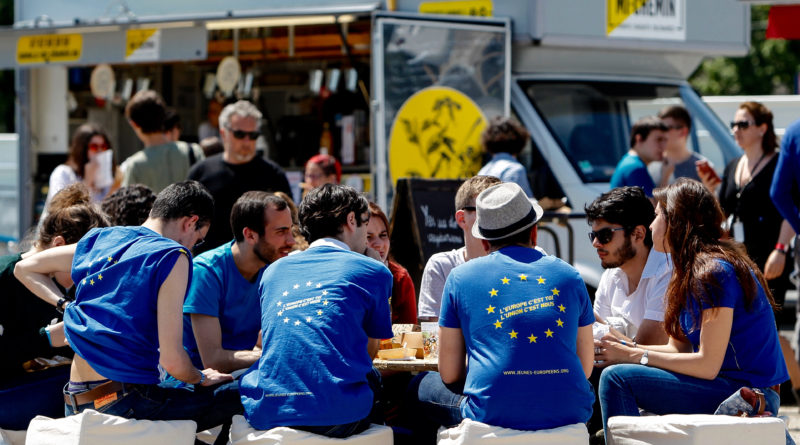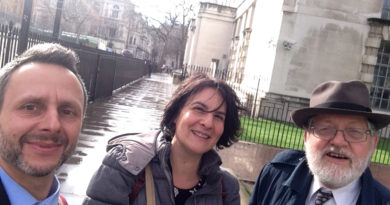Whither EU citizenship?
The United Kingdom plans to end free movement of people from and to the European Union. Germany excludes some EU nationals from social security if they have lived in the country for less than five years. France, Austria, Germany, Denmark and Sweden have temporarily suspended the Schengen Agreement and reintroduced border controls. What is happening to EU citizenship and the idea of a European free movement area? Assya Kavrakova, Executive Director of European Citizen Action Service (ECAS), a group working on citizens’ rights in Brussels, discusses with Europe Street News.
What is the state of EU citizenship? We do not see a lot of positive news on this topic these days.
The situation of citizens’ rights in Europe has deteriorated since 2015 as a spill-over effect of the economic crisis, the surge of immigrants and refugees, and the terrorist threat. The attention has shifted towards security and EU member states have become more inventive, so to speak, on ways to undermine free movement. Problems in the way free movement rules are enforced are not new. In the past, the most problematic issue has been the right to access social security in other EU countries. But since 2015 we have seen more obstacles on the right of entry and residence too. This is worrying because these are the rights at the heart of EU citizenship. At the same time, due to Brexit, the profile of EU citizenship rights has increased, probably like never before. People are realising for the first time that they are losing something and are becoming more aware of the benefits they have taken for granted.
What is the relation between free movement and EU citizenship?
Free movement, or the right to move, study, work and set up business in other EU countries, is a core element of EU citizenship. In the labour market, it is about not being discriminated on the basis of nationality. In political terms, it is about integrating in the host country by having some voting rights. Free movement creates opportunities and allows for different preferences. People move for various reasons: for work, but also for love and study. As an Eastern European who grew up behind the Iron Curtain, I am glad that now we have the chance to decide our way of living. Free movement also fosters an identity. The Erasmus programme of student and professional exchanges is the most notable achievement in this respect. It develops international skills that are appreciated by 92% of European employers, and young people who have been on an Erasmus exchange are three times more likely to vote in EU elections than those who haven’t. All this is part of the values of non-discrimination, rule of law, dignity and solidarity that we all hopefully share.
What are the main problems you see with regard to free movement?
In our analysis [ECAS runs advisory services for people who experience difficulties when moving across the EU] we have found that there are two main vulnerable areas. The first is about the right to access health services in other EU countries. The second is about family life: non-EU family members of EU citizens are still often prevented from joining their families. These are both EU citizenship rights and human rights.
In his annual speech on the state of the European Union, on September 12, the president of the European Commission talked about strengthening European integration in terms of markets and defense. He did not mention EU citizenship. What do you make of it?
We were expecting an address more citizens-oriented. EU citizenship is at a critical point of development and has been shaken all over. It should have been recognised that there are problems on citizens’ rights and solutions should have been put forward. We have an upcoming European election, next year, that could result in many more eurosceptics becoming members of the European parliament. We are discussing the application of the rule of law in countries like Hungary and Poland. We cannot deal with all this without mentioning the unique feature of the EU, which is EU citizenship, and the common values that form its content. There should have been also a reflection on how the EU connects with citizens. We cannot think of democracy as an exercise to make every 5 years. We are in the XXI century and technology is all around us. Technology should not replace representative democracy, but there are ways to stay connected with people in between elections.
Workers rights, such as equal opportunities, working time and parental leave, are also an element of EU citizenship. What is the situation in this area?
The first thing to consider in this area is that 47% of jobs will disappear in the next 20 years and 85% of jobs that will exist in 2030 have not been invented yet, according to recent reports. We are already facing completely different employment conditions than in the past. What does it mean for EU citizens? Are we doing something about it or are we playing catch up with the inevitable?
What do you think Europeans demand from the European Union?
I am not sure if they are clear of what to demand from the European Union and from their government, as they need to know the difference and there is a shortage of knowledge in this area. However, less bureaucracy, more transparency and more genuine engagement in making decisions are common demands. We want to understand how decisions are formulated. Today 75% of the EU legislation is decided behind closed doors in early agreements between the EU Council and the European parliament, according to the European Economic and Social Committee. For me, this is also a warning on the role of the European parliament, which is the only directly elected body of the EU, and is not functioning as an ‘agora’ but as a second chamber of the EU Council.
We always talk about rights. Are there also responsibilities for EU citizens?
Citizens have the responsibility not only to vote, but also to inform themselves and to apply critical thinking. In my view, this aspect of citizenship has been put aside or has been underestimated, and unfortunately the outcome of the EU referendum in the UK shows it. Citizenship without awareness of one’s rights and responsibilities is an empty shell. We have a lot of information these days and the problem is how to interpret it and what to make of it. This requires new skills that universities are not currently supplying.
What does EU citizenship mean for daily life?
EU citizenship is not visible in daily life. It mainly benefits those who exercise free movement, a relatively small portion of the population. EU citizenship has to open up and take into consideration other rights, such as the right to air quality, drinking water and consumer protection. These rights have never been promoted as part of EU citizenship, but they are not available in many other parts of the world: we have them because we are European citizens.
Interview by Claudia Delpero © all rights reserved.
Photo © European Union, 2017. Source: EC Audiovisual Service.





